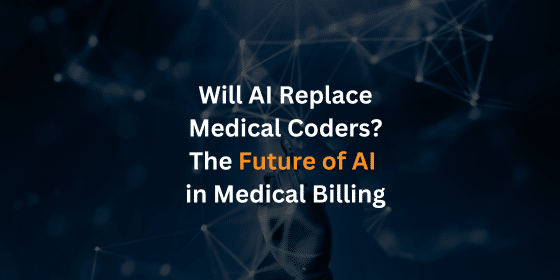Rapid advancements in artificial intelligence (AI) and machine learning have ignited a profound debate within the healthcare industry: Will AI replace medical coders? This question is not just an academic curiosity, but a topic of increasing relevance as technology continues to transform the way medical data is managed and processed. Medical coders play a vital role in ensuring the accurate classification of healthcare procedures and diagnoses for billing, research, and patient care. However, AI-driven coding systems are making significant strides in automating these tasks, raising critical questions about the future of this profession and the potential benefits and challenges AI integration may bring to the healthcare ecosystem. Let’s take a more in-depth look at the abilities and limitations of AI, and assess its future impact.
Why Use AI in Medical Billing?
As we digest the question of “Will AI replace medical coders?” we need to start with why organizations would even look to use AI in place of their billers and coders.
The answer here is relatively simple: the potential for AI to process more claims, faster. Undeniably, AI can comb through data and spit back results faster than a human can, oftentimes without the manual errors that human touch comes with.
An organization called TECHealth released a fascinating analysis of what AI can accomplish in the medical billing world in which they found that AI was able to parse through more than 80% of their claims with either limited or zero human interaction.
If AI was able to completely handle the medical billing/coding process, practices and outsourced billers could potentially realize increased revenue, fewer claim denials, and a more frictionless claim submission process. Practice staff would also have much more time freed up to focus on patient experience and running the practice. The combination of AI and robust medical billing software would likely fuel tremendous efficiency for practices and billers alike
AI’s Limitations in the Billing/Coding Space
Although AI has the potential to make a meaningful impact in the medical billing world, it is not without its shortcomings.
This is especially evident in more complex realms like surgical billing. Medical coding requires a high degree of expertise and specialized knowledge in medical terminology, anatomy, and physiology, as well as a knowledge of the latest coding guidelines and regulations. Beyond this knowledge, interpretation is often necessary, which is where AI can run into trouble.
AI is excellent at parsing through data and handling simple claims, but there are serious doubts as to its ability to capture the full complexity of a patient’s condition and code appropriately for more complex claims.
Additionally, AI is only as good as the information that it is fed/has access to. Before it is implemented on a large scale, the AI used for billing and coding will need to be provided with extremely detailed, nuanced coding information to create an accurate, effective prediction model. This needs to be done by a human with extreme proficiency in billing and coding. Without the best information entering the system, the information that comes out will not be adequate, which creates a considerable risk for those involved in the medical billing process.
There is also the issue of compliance. Who would be responsible for overcoding in a situation where AI gets something wrong? Practices will likely want to have a human check over AI-processed information to prevent liability and insulate themselves from potential errors. There is the issue of HIPAA compliance as well. There needs to be more standardized regulations and protocols for the exchange of information and security for AI to be widely adopted in the medical billing space.
It is also possible that high start-up costs may limit the adoption of AI in the billing world. It is very risky for practices to invest heavily in AI without certainty that it will be efficient and accurate enough to justify the investment. AI will need to demonstrate its financial viability as a solution before being widely adopted.
What Will AI’s Impact Be?
Pending advancement in AI’s ability to interpret information, we see AI as having the potential to take over easier parts of the billing process, but not without human intervention. Whether it’s using AI to process a claim and have a human check it for accuracy, or vice versa, AI is very likely to become a common tool for improving the accuracy and efficiency of the medical billing process. Organizations likely do not want to risk AI making mistakes on a large scale, making human oversight necessary until full confidence in this technology is established. Expect AI to integrate with your medical billing software sooner rather than later.
So, will AI replace medical coders? The answer is no (for now). In the short term, we see AI assisting billers and coders and making their lives easier, not completely taking over the space and eliminating jobs. Of course, this has the potential to change as technology continues to develop.
_________
If you have questions about AI and the role it will play in the medical billing industry in the future, we’d love to speak with you. As leaders in the medical billing space, it is our mission to help businesses optimize their operations and get the most out of the billing process.


